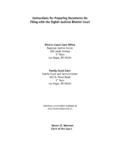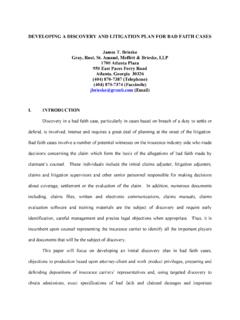Transcription of DISCOVERY (December 2, 2014) - Frederick County
1 DISCOVERY ( december 2, 2014 ) This is a synthesis of DISCOVERY decisions which will govern the resolution of your DISCOVERY dispute, so read this memo carefully before appearing on a DISCOVERY motion. If you are advancing a proposition contrary to one expressed herein, you should have legal authority to support your argument. 1. Consultation among counsel. 2 2. Good Faith. 2 3. Permissible scope generally, party's physical and mental condition. 2 4. Interrogatories are limited 3 5. Limitations in divorce suits. 3 6. Objections. Objections must be specific to allow opposing counsel to appropriately respond to cure the defect without the intervention of the court, and to permit the court to rule intelligently if so required.
2 3 7. Opinions and Conclusions of Law. 4 8. Lack of knowledge. 5 9. Corporations. 5 10. Requests for Production of Documents and Subpoena Duces Tecum. 5 11. Option to Produce Business Records. 6 12. Possession and Control of Documents. 7 13. Documents are Equally Accessible. 7 14. Entry and Inspection of Property. 7 15. Similar Accidents. 8 16. Defendant s Financial Condition. 8 17. Experts. 8 18. Party Statements. 10 19. Work Product and Produced in Anticipation of Litigation. 10 20. Attorney Client Privilege. 12 21. Peer Review and Quality Assurance Records, Treatment Protocols. 13 22. Duty to Supplement.
3 13 23. Requests for Admissions. 14 24. Deposition Procedure. 14 25. Insurance Agreements are discoverable. 16 26. Fifth Amendment Privilege 16 27. Independent Medical Examination 17 28. Identification of Scientific Authorities relied upon by Expert Witness 17 29. Department of Social Services Records 17 2 1. Consultation among counsel. Counsel are encouraged to participate in pretrial DISCOVERY conferences to minimize the filing of unnecessary DISCOVERY motions. No DISCOVERY motion should be filed until counsel has discussed with opposing counsel the DISCOVERY in controversy. The Court will not consider any motion concerning DISCOVERY matters, unless the motion is accompanied by a statement of counsel that a good faith effort has been made between counsel to resolve the DISCOVERY matters in dispute.
4 All relationships are improved by courtesy. Former Virginia Code of Professional Responsibility, EC 7-35, provided that: A lawyer should be courteous to opposing counsel and should accede to reasonable requests regarding court proceedings, settings, continuances, waiver of procedural formalities, and similar matters which do not prejudice the rights of his client. Courtesy is the foundation of all viable human relationships, and this rule still applies to the practice of law in Virginia. 2. Good Faith. Rule 4:1(g) provides that: The signature of the attorney or party constitutes a certification that the signer has read the request, response, or objection, and that to the best of the signer's knowledge, information, and belief formed after reasonable inquiry it is: (1) consistent with these Rules and warranted by existing law or a good faith argument for the extension, modification, or reversal of existing law; (2) not interposed for any improper purpose.
5 ; and (3) not unreasonably burdensome or expensive, given the needs of the case .. Despite this admonition, objections have been made to DISCOVERY on the sole ground that the attorney did not understand the meaning of the following words: "similar accidents, examine, paid, warranty claim, notify, respond, and medical treatment." These are words of common parlance and were used in their ordinary context. In each instance the objection was contrary to the rules of DISCOVERY and was overruled. A retreat into rubrics in DISCOVERY is usually the last gasp of the desperate. 3. Permissible scope. Rule 4:1(b) provides that "parties may obtain DISCOVERY regarding any matter, not privileged, which is relevant to the subject matter involved in the pending action, whether it relates to the claim or defense of the party seeking DISCOVERY , or to the claim or defense of the other " This is almost the same as Federal Rule of Procedure 26(b).
6 Virginia has adopted the Federal Rules of DISCOVERY "verbatim so far as consistent with Virginia practice .. to enable Virginia lawyers and circuit court judges to use federal precedents to guide Virginia practice in the field of DISCOVERY . W. H. Bryson, Handbook on Virginia Civil Procedure (2d ed. 1987), p. 319. See, Smith v. Nat'l. R. Passenger Corp., 22 Va. 348, 350 (Richmond 1991). In personal injury cases, traumatic personal experiences which occurred more than a year before the accident or incident, except for past accidents and physical injuries, will not generally lead to admissible evidence, so questions about teenage abortions and suicide attempts, childhood physical or sexual abuse, and tempestuous past divorces are usually improper, and the party seeking to obtain such information must show good cause as to why such a line of inquiry may produce admissible evidence.
7 Where a plaintiff is claiming damages for psychological treatment as a result of an accident making his or her past psychological condition an issue in a particular case, questions designed to elicit information about the plaintiff's past psychiatric and psychological treatment may be asked, such as when, where, and why for each such treatment, but personal questions like "how did that abortion or incident make you feel" are not proper. If such an inquiry is to lead to admissible evidence, it could only be through the vehicle of an independent psychological or psychiatric evaluation, so while the examining health care provider may ask such a question, a lawyer generally may not. 3 In a personal injury action, the plaintiff is usually required to respond to DISCOVERY about his prior medical history.
8 As a general rule, all of the plaintiff's medical records and medical history with respect to that portion of the body which was allegedly injured are discoverable, so in a back case all records and history of the plaintiff's back from the time of birth to the present are discoverable. However, DISCOVERY inquiries about the plaintiff's general medical and psychological history and injuries to portions of the body, which are not alleged to have been injured, are generally limited to five years preceding the accident. However, even though they are discoverable, the Plaintiff only has to produce medical records which he actually has in his possession. See section 12 of this memo. 4. Interrogatories are limited to thirty including subparts.
9 Rule 4:8(g). They should be concise not canned. Given the fact that number of issues which a Court is potentially required to consider in domestic cases (fault, equitable distribution (10), child support (18), custody (10), and spousal support (13)) exceeds thirty and the wide array of property issues, the interrogatory limit does not apply to subparts in domestic cases. An exception to this rule is usually granted in complex cases like professional negligence, products liability, and complex business litigation, where there is a multi-count complaint alleging conspiracy, tortious interference, breach of fiduciary duties, 5. Limitations. DISCOVERY limited in divorce suits to "matters which are relevant to the issues.
10 " Rule 4:1(b)(5). 6. Objections. Objections must be specific to allow opposing counsel to appropriately respond to cure the defect without the intervention of the court, and to permit the court to rule intelligently if so required. See generally DISCOVERY : The Successful Advocate's Advantage Virginia CLE, pp. II-15-16 (1995). Objections to interrogatories must be specific and must be supported by a detailed explanation of why a particular interrogatory or class of interrogatories is objectionable. 23 Am. Jur. 2D Depositions and DISCOVERY 136. "Objections should be plain enough and specific enough so that the court can understand in what way the interrogatories are claimed to be objectionable.






